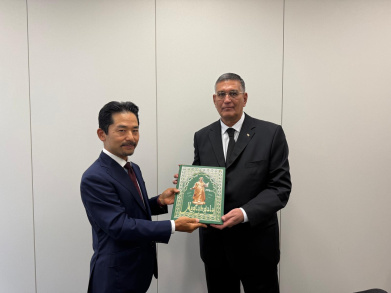Caspian Sea problems to be discussed at Nevsky International Ecological Congress
05.05.2025 | 16:40 |The business program of the XI Nevsky International Ecological Congress, which will be held on May 22-23 at the headquarters of the CIS Interparliamentary Assembly under the motto "Planet Earth: Harmony of Man and Nature", includes a thematic session "Caspian: Cooperation for the Future".
As noted on the congress website, the Caspian Sea is a unique natural object, the largest lake on Earth. About 130 rivers flow into the sea, located on the territory of all Caspian states - Russia, Azerbaijan, Iran, Kazakhstan, Turkmenistan. Over the past two decades, a record low level of the Caspian Sea has been recorded, which has dropped by almost three meters with the coastline retreating to a distance of 15-20 km. The solution to the problem of water balance fluctuations is possible only through coordinated response measures at the interstate level of all Caspian states, strengthening scientific research cooperation in studying shallowing processes due to global climate change in the region.
Such studies are of great importance for preserving the Caspian Sea ecosystem and ensuring further sustainable development of economic activities of the coastal countries. The mechanisms of the Framework Convention for the Protection of the Marine Environment of the Caspian Sea are the basis for five-party cooperation on the issue of sea level fluctuations, pollution prevention, protection from the consequences of environmental emergencies, conservation, restoration and rational use of biological resources.
The experts will discuss a range of issues related to interaction in the transport and logistics sector and the development of tourism potential, the development of programs for the conservation of biological diversity, including sturgeon and the Caspian seal, as an indicator of ecosystem sustainability, and will exchange views on how to intensify work on CASPCOM to address environmental and climate problems in the region and what approaches can be used for medium-term and long-term forecasting of the Caspian Sea level.
The discussions will be held within the framework of the main program of the congress, the central event of which will be the plenary session "Ecology of the New Reality: Challenges and Opportunities". The organizers expect that it will become the most important platform for strategic discussion of global and national environmental challenges, as well as opportunities for the development of a "green" economy and international cooperation.
Round tables and sessions on May 22 will address issues of food security and climate risks, sustainable ecotourism, the use of artificial intelligence and digital solutions in the field of ecology, the development of a closed-loop economy, the role of women in promoting environmental initiatives, green investments, subsoil use and low-carbon technologies.
On May 23, the UNESCO session will consider the management of world natural heritage sites and the development of transboundary nature conservation areas. There will also be a discussion of the prospects for water and energy cooperation between Russia and Central Asian countries - participants will touch on issues of water resource distribution, infrastructure modernization and adaptation to climate change.
An important component of the business agenda of the Nevsky Ecological Congress is the Youth Program, which includes a discussion of the role and participation of young people in solving climate problems, forming an environmental culture, developing environmental volunteering, involving children in the "green" agenda, as well as the role of youth climate initiatives in a sustainable future.
The Nevsky International Ecological Congress has been held in St. Petersburg since 2008 and is a platform for: strengthening inter-parliamentary cooperation in the field of ensuring environmental safety and harmonizing environmental legislation of the CIS member states; enhancing the role of environmental education and training of the population, promoting healthy lifestyle ideas; forming an international agenda related to policy in the field of environmental safety, in cooperation with specialized institutions of the UN system.











